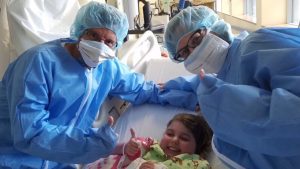The recounting of Marisa Tufaro’s courageous journey with post-transplant lymphoproliferative disorder (PTLD) may one day impact treatment in the United States of the rare form of cancer that claimed her life.
Cyndi and Greg Tufaro shared the story of their daughter’s valiant battle with PTLD during a historic patient-focused drug development meeting with U.S Food and Drug Administration (FDA) leaders held virtually in 2022 and during a first-of-its-kind PTLD patient and caregiver advisory board meeting in Houston three years prior.
 The National Organization for Rare Disorders (NORD) hosted the former for the patient community, researchers, medical product developers and health care providers. Summarized in a comprehensive 63-page report and recorded on video, the four-hour meeting was designed to give a powerful voice to inspirational PTLD survivors, as well as grieving caregivers who lost a loved one to the disease.
The National Organization for Rare Disorders (NORD) hosted the former for the patient community, researchers, medical product developers and health care providers. Summarized in a comprehensive 63-page report and recorded on video, the four-hour meeting was designed to give a powerful voice to inspirational PTLD survivors, as well as grieving caregivers who lost a loved one to the disease.
From that meeting, the FDA took into account the collective shared experiences, perspectives, needs and priorities in considering medical product development and regulatory decision making for PTLD treatment. The Tufaros followed up the meeting with a personal letter last year to the FDA, which appreciates the urgency of the need for the development of additional therapies for PTLD.
Today, as awareness about rare diseases such as PTLD are heightened on Rare Disease Day (observed annually worldwide on the last day of February), Marisa’s story has added meaning.
A rare but well-known complication of solid organ transplant and hematopoietic stem cell transplantation, PTLD is classified as a lymphoma, a group of related cancers that affect the lymphatic system. PTLD is characterized by the overproduction and spread of too many white blood cells (lymphocytes).
Born with a complex cardiac defect that required six open-heart surgeries, Marisa developed two life-threatening conditions that necessitated a heart transplant. She contracted PTLD four months after receiving a new heart.
Eternally grateful for the time God blessed them with Marisa, her parents struggle daily to live with the tragic irony that the transplant performed to save their beautiful daughter’s life inevitably claimed it, along with the heart of a donor whose family is also grieving.
According to the Leukemia & Lymphoma Society and the Alliance for Patient Access, the FDA has yet to approve any therapies to treat PTLD.
Be The Match, a nonprofit under the auspices of the National Marrow Donor Program dedicated to helping patients receive life-saving transplants, notes standard treatments for PTLD typically include:
- A reduction of immunosuppression to see if the patient’s own immune system can fight the PTLD.
- The administration of Rituximab (Rituxan) to target the patient’s B cells.
- The use of aggressive chemotherapy.
- The use of other treatments in development that are available through clinical trials.
The treatment protocol for patients with PTLD – including Rituxan and chemotherapy – failed to thwart the relentless onslaught of the disease that riddled Marisa’s brain and body.
She died on the same day (Jan. 30, 2017) the screening period to receive potentially life-saving immunotherapy through a clinical trial ended and after repeated last-ditch attempts at whole-brain radiation therapy failed. Marisa was just 13 years old.
Despite the apparent insurmountable odds, Cyndi and Greg would like to believe that had Marisa been able to receive and respond to immunotherapy before the PTLD spread to her brain, she would have had a better chance of survival.
Marisa’s case of PTLD, according to the medical director of heart failure, cardiomyopathy, and cardiac transplantation at one of the nation’s leading children’s hospitals, was “a very grave form” that “occurred very early after transplant and was very widespread.”
“I would qualify that as a rare occurrence,” the doctor said of Marisa’s PTLD. “Quite honestly, it’s rare enough that in my own limited practice (with PTLD) I would say I haven’t seen proliferation into the brain. I can imagine that it would be very much so a more difficult scenario to treat.”
As the FDA considers treatment options for American patients, including the immunotherapy for which Marisa was eligible through a clinical trial, recounting her story has an opportunity to positively impact the lives of others, as does the nonprofit bearing Marisa’s name.
Since its inception six and a half years ago, The Marisa Tufaro Foundation has already made a profound impact, donating more than $300,000 to assist pediatric patients and other children in need throughout the greater Middlesex County area.
The nonprofit has also donated thousands of toys, nonperishable food items, winter jackets, baby supplies and other items upon which it has placed no monetary value. In addition, The Marisa Tufaro Foundation has awarded $29,500 in academic scholarships to 42 high school graduates.
The foundation also provides a PTLD resource page on its website.

